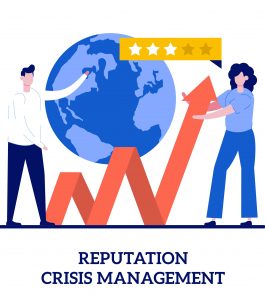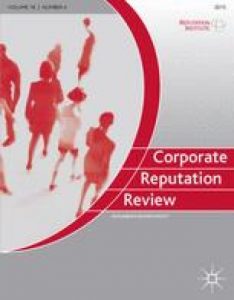The rationale for Corporate Reputation Analysis Automation

We live in an age where news stories are no longer a primary, but an added concern for businesses trying to build and maintain a strong reputation. Individual experiences are reaching a global audience in a matter of minutes, thanks to the internet, which has made way for an immense volume of spontaneous and real-time information. There is no doubt that companies have to navigate the voices of traditional and contemporary media sources, both of whom contribute significantly to their social standing. Reputation crises can spark at any moment, and traditional reputational audits can not help to mitigate them. Consequently, it is more important than ever before to keep track of reputation in real-time.
The MeaningCloud Corporate Reputation Analysis API is a new service that enables companies to take advantage of social networking platforms, forums, blogs, surveys, and news sources in a bid to do just that. While we have been running a service in this field since 2011, our new API employs a distinct approach to tackle the task of Corporate Reputation analysis.
Reputation management fundamentals
The MeaningCloud Reputation API uses a categorization scheme based on the work by Charles Fombrun and Cees van Riel. In 1999, they founded The Reputation Institute (now, The RepTrak Company™), the world’s leading reputation data and insights company. In collaboration with Harris Interactive, The Reputation Institute developed Reputation Quotient (RQ) in 1999, replaced in 2005 by the RepTrak® model.
The RepTrak Company™ has become highly esteemed on a global scale for its publication of reports on corporations’ reputation (as well as countries and cities). Furthermore, it has developed models that have provided companies with the autonomy to qualify their reputation in a meaningful way. It is important to note that other well-known frameworks do exist. The MERCO Indexes, for instance, are particularly renowned in Spain, Portugal, Italy, and across Latin America for their “multi-stakeholder methodology, composed of six evaluations and more than twenty information sources”. MERCO has been analyzing reputation since the year 2000.
To analyze Corporate Reputation in a piece of text, we follow the seven dimensions proposed in the foundational work of this field, globally considered to be the most important drivers of reputation:
- Citizenship:
Both a company that actively strives and one who is idle in their efforts to be environmentally responsible, ensuring they support good causes and positively influence society, are equally susceptible to a change in their reputational outlook. - Governance:
A company needs to be open and transparent, ethical and fair in order to boost its reputation. - Innovation:
Innovative companies are market leaders and adapt quickly to change generally have a better social standing. - Leadership:
Suppose a company has inspiring/motivating leaders who display personal integrity, competence and knowledge, effective communication, and a clear vision for the future. They are likely to have a positive effect on the company’s repute. - Performance:
A measure of determining how profitable a company is, whether they exceed expectations and have solid prospects for the future. All of which are qualities of a reputable company. - Products and Services:
High-quality products/services that meet customer needs and are fully backed by the company undoubtedly contribute to a company’s social status. - Workplace:
A company must reward employees fairly, show genuine concern for them, and respect diversity to maintain a good reputation.
Our new Corporate Reputation API
The MeaningCloudReputation API is now available in 57 languages. The core processing is carried out in English. For other languages, the source text is translated first with the MeaningCloud Machine Translation API. For example, a user can throw an API request with a text in German. He/she can specify the source language (if known) as a parameter in the call or select “autodetect” to let our algorithms discover the source language, translate it into English (if needed), and carry out the reputation analysis on the translated text.
The MeaningCloud Corporate Reputation API goes beyond the automatic discovery of a mention related to a particular dimension in a Corporate Reputation model:
- It first detects the language of the text under analysis and translates it into English if needed.
- It disambiguates the mentions of entities in the text. Users can extend the (vast) resources updated daily in the platform with new companies via user dictionaries.
- It discriminates the reputation dimensions evoked in the text.
- It analyzes each dimension’s polarity (positive, negative, neutral, or non-existent) in a reputational context.
- It attaches the pair dimension/polarity to one of the entities mentioned in the text or to a declared default entity.

Tools for PR, communication, marketing, and social listening companies
MeaningCloud is just a tech company specialized in Natural Language Processing. We do not collect information over the internet to assess the reputation of companies. Instead, we build the technology that permits third parties to develop and leverage NLP technology to provide actionable insights into:
- The overall perception of the company.
- The impact that news and social media content have on the company’s reputation.
- The areas of the company requiring special attention.
- The areas of the company making a good impression.
- Third companies that are mentioned jointly and how their respective reputations compare.
The limits of the technology
As always with NLP solutions, and despite our continuous efforts, this API cannot be entirely free from errors or biases coming from different sources:
- Our interpretation of the dimensions of reputation, that we know through the widely available literature on this subject.
- Limitations in our algorithms for linguistic analysis and translation models.
- Lack of adaptation to a particular domain or industry. Our general-purpose API can be improved to interpret reputational aspects more precisely when analyzing companies in a particular industry: utilities, finance, retail, telecom, healthcare, etc.
Our Corporate Reputation API derives from:
- Our experience in customer feedback analysis, using the same basis as our Voice of the Customer analysis models.
- The version of the API for Spanish, which has been public since 2012 (at textalytics.com until 2015 and at meaningcloud.com since then.)
Free Corporate Reputation Analysis
Our API is now published in beta version. For now, the pricing is the same as for other premium APIs: one request (or credit) is charged per 125 words or fraction. Two credits if translation is required. However, temporarily, there is no need to pay a flat fee for usage, as is the case for our Voice of the Customer/Employee APIs.
Follow this link to learn more about our Corporate Reputation API.
Furthermore, remember that you can test the API extensively, analyzing up to 20,000 texts for free per month, just by registering at meaningcloud.com.
Disclaimer
To be completely transparent about our credentials, we have to make it clear that:
- MeaningCloud has no link with The RepTrak Company™.
- We are not endorsed by The RepTrak Company™ in any way.
- We do not claim to be implementing any model by The RepTrak Company™.
 References
References
An excellent source of information about this field is the journal Corporate Reputation Review. Launched in 1997, it publishes empirical and conceptual research on reputation management and closely related fields, such as strategic/corporate communication, corporate social responsibility (CSR) communication, corporate identity, and organizational identity.
Fombrun, C. and Shanley, M., 1990. What’s in a name? Reputation building and corporate strategy. Academy of management Journal, 33(2), pp.233-258.
Fombrun, C. and Van Riel, C., 1997. The reputational landscape. Corporate reputation review, pp.1-16.
Fombrun, C.J., Gardberg, N.A. and Sever, J.M., 2000. The Reputation Quotient SM: A multi-stakeholder measure of corporate reputation. Journal of brand management, 7(4), pp.241-255.
Fombrun, C.J., Van Riel, C.B. and Van Riel, C., 2004. Fame & fortune: How successful companies build winning reputations. FT press.
Ponzi, L.J., Fombrun, C.J. and Gardberg, N.A., 2011. RepTrak™ pulse: Conceptualizing and validating a short-form measure of corporate reputation. Corporate reputation review, 14(1), pp.15-35.
Fombrun, C.J., Ponzi, L.J. and Newburry, W., 2015. Stakeholder tracking and analysis: The RepTrak® system for measuring corporate reputation. Corporate reputation review, 18(1), pp.3-24.
Pallarés Renau, M. y López Font, L., 2017. Merco y RepTrak Pulse: Comparación cualitativa de atributos, variables y públicos, Icono 14, volumen 15 (2), pp. 190-219.
Janine Garcia, Nadine Shallow, Maria Jose Garcia, Concepcion Polo, and Jose Gonzalez

